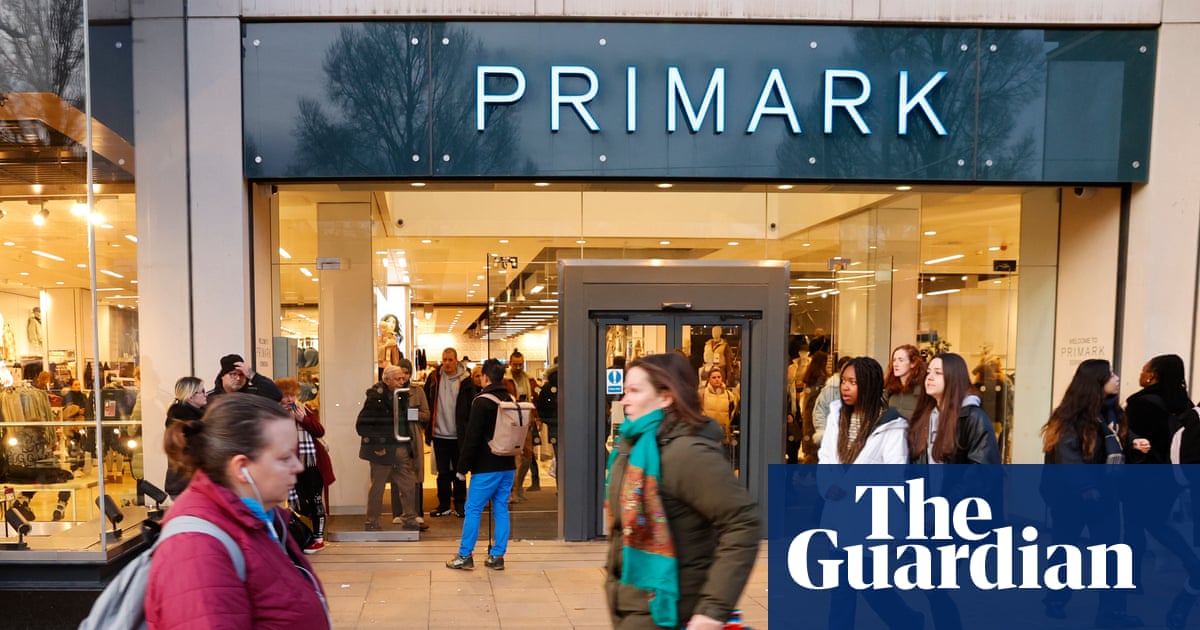
The boss of Primark’s parent group has urged Rachel Reeves to avoid hitting consumers with a repeat of last year’s tax-heavy budget which he claimed sent the retailer’s sales into reverse, saying “don’t do it again”.
As the chancellor prepares to make her budget speech on 26 November, George Weston, the chief executive of Associated British Foods (ABF), said: “A budget this late has the potential to have an enormous impact on Christmas trading.”
Weston said “any tax rises are going to have an impact on consumer confidence,” but urged Reeves to “tax the rich folks” instead of opting for a sweeping rise in VAT or income tax that would affect most households.
Weston said Primark’s Christmas ranges were now “trading really well in the UK and we have got some wind in our sails” but he said that if you considered the outlook for consumer spending “you could be gloomy”.
He said that the chain’s sales reversed from growth before last year’s budget, to a steep drop-off in the run-up to Christmas. He added: “I carry scars from [that] budget.”
Weston’s comments emerged as ABF said it is considering splitting the fashion retailer from its food division, which contains brands including Twinings and Kingsmill, amid a “challenging external backdrop”.
It is considering splitting off Primark from its food arm, which includes sugar production and grocery brands, “with a view to maximising long-term value”.
The group has launched a strategic review, carried out with the help of the advisory firm Rothschild & Co, with the backing of its largest shareholder, the Weston family’s Wittington Investments.
The company said the family, which owns 59% of ABF, remained “committed to maintaining majority ownership of both businesses”. The family sat in sixth position on the 2025 Sunday Times Rich List, with its wealth valued at nearly £18bn.
ABF, which is valued at £16bn as a group, said no decision had been taken and the board would provide an update “as soon as practicable”. Analysts at Panmure Liberum suggested that a separated Primark could be worth more than £15.5bn and the food businesses more than £3bn.
Weston said he fully backed the review, adding that ABF’s food business was “less well understood” than Primark but had “a highly attractive portfolio, deep global expertise and much potential”.
Earlier this year, the Primark chief executive, Paul Marchant, resigned after an allegation made by a woman about his behaviour towards her in a social situation.
The group also announced a fall in sales and profits on Tuesday as its sugar and agriculture businesses faced higher costs and it closed its Vivergo bioethanol plant.
after newsletter promotion
ABF said pre-tax profits had slumped by more than a quarter to £1.4bn as revenues slipped by 3% to £19.4bn in the year to 13 September.
Its sugar business fell £205m into the red as its revenues slid 12% to £2bn after the decision to close Vivergo as well as higher costs and lower prices for its sugar.
Sales at Primark rose 1% to £9.5bn. A 3% fall in sales at established UK and Irish stores was offset by 20% growth in the US and 2% growth in mainland Europe, where Primark is opening new stores.
It added that shopping activity within elements of Primark’s customer base was particularly weak as the spending power of those on low incomes was hit by higher energy and food bills.
Primark has more than 470 stores across 18 countries, including 187 shops in the UK.
ABF closed Vivergo after the UK government signed a duty-free deal on the product with the US. It is also finalising the merger of its bakeries business, which includes the Kingsmill brand, with its rival Hovis.
Disclaimer : This story is auto aggregated by a computer programme and has not been created or edited by DOWNTHENEWS. Publisher: theguardian.com








